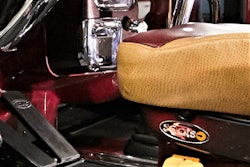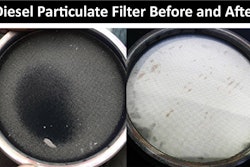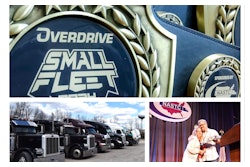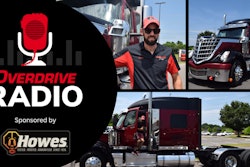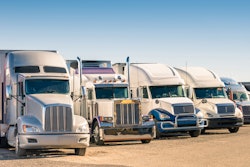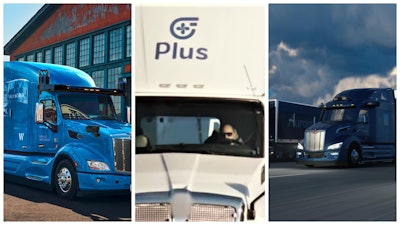
Given the litigation-happy activities of plaintiff's attorneys when it comes to truck-involved crash lawsuits, a panel convened at the Truckload 2022 conference of the Truckload Carriers Association last week in Las Vegas provided insight on just who would be the principal litigation target in crashes involving possible future rigs piloted in large part by automated systems.
In the view of Wiley Deck, former Federal Motor Carrier Safety Administration chief and now vice president of government affairs with autonomous-systems developer Plus.ai, post-crash litigators would target not only trucking companies, but also companies like his own, and truck manufacturers. "Everybody is liable," Deck put it bluntly in response to a question from the moderator of the discussion, Dave Williams of Knight-Swift.
"That's the easiest answer, because that’s who the trial attorney will go after," Deck elaborated, predicting an "exponential increase of exposure in liability lawsuits" for truck manufacturers, given they just don't experience a high level now compared to motor carriers large and small considered together.
His own company and others like them, too, Deck wagered, would be a target. "The OEM chose us" as a technology partner "and sold that vehicle" to the motor carrier. Given on-board vehicle systems likely to be responsible for piloting autonomous rigs of an uncertain future, OE "exposure will be exponentially greater than it is now. ... If I were an OEM, I would have reservations."

[Related: How a plaintiffs' attorney shop works -- and how to play defense work it]
Deck was joined on the panel by representatives from the Waymo company, owned by Google parent company Alphabet, as well as tech developer Aurora. "Controlling where those [future autonomous] vehicles are allowed to be operating" could develop into a strategy to mitigate liability risk, Deck said in reference to Texas' tort reform legislation, expected to limit the size of so-called "nuclear verdicts."
For his part, though, Charlie Jatt, Waymo's trucking commercialization head, disagreed with the notion that truck-maker liability exposure increases were inevitable. "We stand behind our technology, full stop," he said. "Our lane is pretty clear. We are driving the vehicle" as a tech provider. "To any extent that there's an incident from driving the vehicle, we stand behind that."
The liability situation, Jatt felt, might only be likely to get nuanced when there's evidence of motor carrier maintenance negligence. The Waymo "business model [is] to make [technology] available to carriers like you all that you can purchase and utilize in your business," Jatt said. "Most of the driving task will come down to Waymo. Some of it may come down to how did you take care of that asset. That’s where some of that nuance may creep in."
Jatt felt that today's post-crash litigation environment features a great deal more nuance, and risk, than is likely to be the case if fully autonomous vehicles are in play. "Right now, if a truck driver gets into an incident," he said, questions arise as to the conditions the driver was put it: "Were they overworked? How were they trained? All sorts of things where the carrier's responsibility gets muddied with driver performance. The line gets a little clearer with autonomous development."
Aurora Vice President of Truck Programs Dima Kislovskiy agreed with Jatt, to an extent, on the question of crash liability. Autonomous system "failures can occur," sure, he noted, but stressed a "very tight partnership with an OEM, ... getting really good requirements of what their platform is supposed to support" as a way of better defining the responsibility/liability line between the parties.
"It’s about defining the line very dramatically," Jatt said.
It could be quite a while, though, before real-world tests of the question of liability are seen in numbers sufficient to gauge, though. The difficulty of achieving autonomous development -- "you're literally trying to teach a stone how to drive a truck," Kislovskiy said -- means it's likely to be a long time indeed before driver displacement from manning the controls in-cab happens in any significant way.
[Related: Behind the wheel with 'autonomous driving' start-up Plus' safety driver Ruben Cardenas]
"On the road today what you see is specially trained test drivers ... sometimes carrying real freight in commercial applications," said Jatt, "but we’re on the cusp where you’ll start to see more commercial deployment." He emphasized, however, that "this tech is still very early in development."
All three providers represented on the panel sought to reassure today's active CDL drivers in longer-haul applications that displacement of operator positions isn't in the cards for the foreseeable future, though all three are working clearly toward moving the human operator out of the mix with a so-called "Level 4" autonomous system.
Each of the panelists stressed safety improvements as the No. 1 goal in pursuit of it, with Kislovskiy pointing out that continuous improvement is the reality of the way its software system learns: "The collective experience of our fleet is brought to bear in every system that we deploy. ... We might get a novel situation," but after a test vehicle has encountered it, "subsequent versions of the software have the benefit of having been trained with that scenario in mind. This is really the most experienced driver" anywhere.
Yet the state of play today is such that there's still no substitute for the human mind's quick-reaction creativity. "If you are just entering" trucking, Deck said, "you’ll be able to retire as a truck driver, if you want to. This industry is so diverse, so large – we’re talking millions of trucks out there right now. … How quickly can the OEMs replace all these trucks?"
We're many "years out before we see vast quantities" of automated vehicles on the roads, Deck believed.
Jatt offered a caveat to the discussion of the speed of development, though. "Can any of us really predict how this will turn out?" he asked. "Well, no."
[Related: Over-the-road reality creeps toward 'automated future'?]





